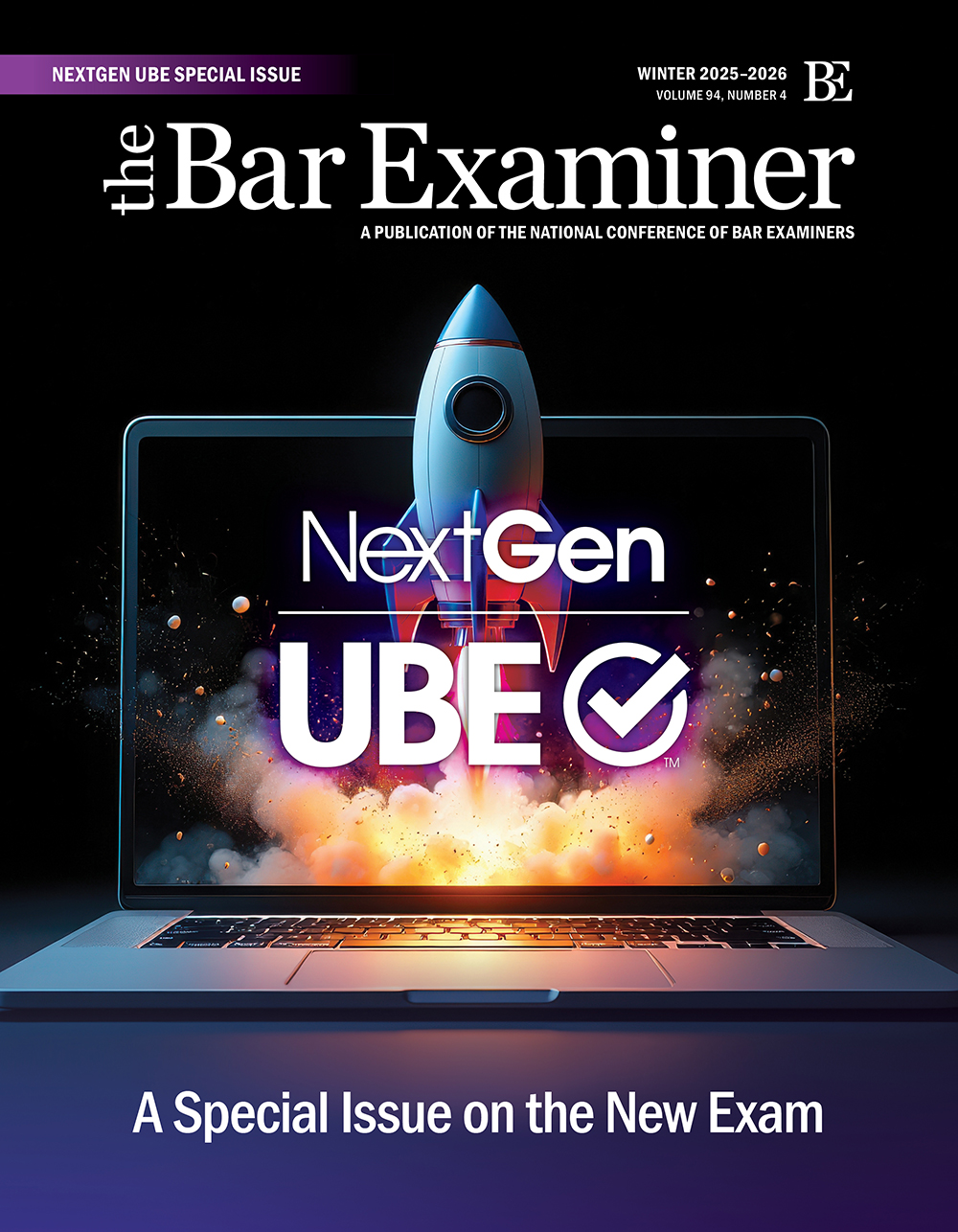This article originally appeared in The Bar Examiner print edition, December 2015 (Vol. 84, No. 4), pp. 47–52.
By Kellie R. Early and Jessica GladADA Testing Accommodations
Eleventh Amendment immunity
Turner v. Nat’l Council of State Bds. of Nursing, Inc., No. 13-3088, 561 Fed. Appx. 661 (10th Circuit) (KS 2014)
Barry Turner applied to the Kansas State Board of Nursing (“Board”) to take the licensing examination to become a registered nurse. The National Council of State Boards of Nursing, Inc. (“Council”) designs and administers the examination. The application form did not include a provision for requesting testing accommodations or indicating the need for accommodations. Turner inquired with a staff member at the Board’s office about how to request accommodations. He was told that if he took the examination with accommodations and passed it, his nursing license would be “restricted and limited.” Turner was diagnosed with dyslexia at a young age and also suffers from testing anxiety; he received accommodations on examinations in school. He took the nursing licensing examination without accommodations and failed.
The examination was administered in a computer adaptive testing (CAT) format. Turner alleged that academic research has revealed significant flaws with the CAT format, including flaws specifically related to examinees with testing anxiety. The CAT format required each examinee to answer at least 75 questions, but the computer program inexplicably shut down after Turner had answered only 57 questions. The test results he received from the Council erroneously stated that he had answered 84 questions. Upon learning that he had failed, Turner contacted both the Board and the Council to ask if he could appeal the results and was told by both entities that “there was no point” in appealing “because no test result had ever been changed.”
In his complaint to the U.S. District Court for the District of Kansas, Turner asserted that the following conduct by the Board violated Title II of the Americans with Disabilities Act Amendments Act of 2008 (ADAAA): “(1) failing to provide a location on the licensing exam application for an applicant to describe his disabilities and request accommodations; (2) denying him reasonable accommodations for the licensing exam; (3) threatening to restrict his license if he took the exam with accommodations, which both deterred him from pursuing a request for accommodations and prospectively interfered with his practice of nursing; (4) failing to provide an appeal procedure for applicants who took the licensing exam; and (5) failing to provide a format other than the CAT format.” Turner also asserted that the Council violated Title III of the ADAAA by failing to provide the examination in a format other than CAT, and by failing to provide an opportunity for him to appeal his score. Notably, he did not allege that he had ever submitted any materials to the Board or Council to request accommodations, nor did he allege that his dyslexia or testing anxiety caused him to fail the examination. He sought damages and unspecified declaratory and injunctive relief.
The Board moved to dismiss all claims against it based on sovereign immunity under the Eleventh Amendment. At issue was whether Congress validly abrogated sovereign immunity under Title II of the ADAAA for claims involving professional licensing examinations. The District Court concluded that the Board’s sovereign immunity was not abrogated with respect to Turner’s claims because he failed to adequately allege a constitutional violation. Turner argued that his claims alleged (1) a violation of substantive due process based on denial of access to the courts and (2) a violation of the Equal Protection clause based on lack of a rational basis for the Board’s threat to restrict his license if he took (and passed) the licensing examination with testing accommodations because there was no evidence that his dyslexia would affect his ability to practice nursing. The District Court dismissed Turner’s claims, and Turner appealed to the Tenth Circuit Court of Appeals.
The Court of Appeals noted that Turner did not cite any authority for the proposition that the right of access to a licensing examination, or to a professional license itself, is part of a fundamental right of access to the courts. With respect to the alleged Equal Protection clause violation, the Court of Appeals noted that professional licensing decisions are subject to a rational basis standard, and concluded that the “district court properly found that legitimate public safety concerns could provide a rational basis for Kansas to restrict the license of a nurse who had to take the licensing exam with accommodations in order to pass it.” Turner had the burden to negate any conceivable facts that could provide a rational basis for the classification, and he failed to do so.
In the absence of a Fourteenth Amendment violation, the District Court had considered whether Congress validly abrogated Eleventh Amendment sovereign immunity under Title II “for claims involving professional licensing” and concluded that it did not. The Court of Appeals affirmed, finding that the specific constitutional right at issue was a disabled person’s right to practice his chosen profession and that the relevant category of state action was “professional licensing.”
The Court of Appeals also found that the Ex Parte Young doctrine did not apply to avoid sovereign immunity because Turner’s claims related only to past conduct and did not seek prospective relief, such as ordering the defendants to allow him to retake the examination with accommodations or to appeal his failing test score.
Regarding Turner’s claims against the Council, the Court of Appeals concluded that he lacked standing to assert his claim related to the CAT format because he did not allege a sufficient causal connection between the Council’s use of the CAT format and his failure to pass the examination. Although he did allege a sufficient causal connection between the Council’s failure to allow him to appeal his score and his failure to obtain a nursing license to have standing, he failed to state a claim under the ADAAA. The Court of Appeals explained: “Even if we assume that the Council’s failure to provide an avenue to appeal an exam score could give rise to liability under the ADA, Turner’s allegations are not sufficient to establish liability in this case. Turner does not allege that his inability to answer the requisite number of questions before the program shut down was related to his dyslexia or that the computer glitch was related to flaws in the CAT format that supposedly disadvantaged candidates with test-taking anxiety. Without some connection between the computer glitch and his dyslexia, the Council’s failure to provide Turner an appeal is not actionable under the ADA.”
The judgment of the District Court was affirmed.
Character and Fitness
History of criminal charges; lack of candor; rehabilitation
In the Matter of Burke, 368 N.C. 226, 775 S.E.2d 815 (NC 2015)
Lynn Marie Burke applied in October 2010 to take the North Carolina bar examination. At the time of her North Carolina application, she had a pending application for admission to the District of Columbia bar. In her North Carolina application, Burke disclosed 40 criminal charges against her between 1983 and 2004, including forgery, larceny, shoplifting, writing worthless checks, using a stolen credit card, possessing stolen property, and obtaining property by false pretenses. She acknowledged that many of these charges had resulted in convictions, and characterized her conduct as being motivated by financial necessity.
She testified in a hearing before the North Carolina Board of Law Examiners (“Board”) that she had changed her life after a shoplifting incident in 2002 when her twin daughters learned what she had done. After that, she began receiving counseling and working for her father. She testified that she had not stolen anything since the 2002 incident.
The Board noted inconsistencies in her account of the 2002 incident between her written accounts and her subsequent testimony in the hearing. In written amendments to her D.C. and North Carolina applications, Burke described the 2002 incident as occurring a week before her daughters’ prom and involving attempted shoplifting of undergarments. In a subsequent written amendment to her D.C. application, she stated that the incident occurred one day before the prom and involved attempted shoplifting of two prom dresses and shoes. In the hearing before the North Carolina Board, she testified that it occurred the day of the prom and involved prom dresses. The Board found that these inconsistencies “showed a lack of candor.”
Ultimately, the Board found that Burke failed to disclose on her application to law school six criminal convictions; she failed to disclose seven criminal charges on her D.C. bar application; she was charged on six occasions with Failure to Appear and failed to disclose those six charges on her North Carolina bar application; she was charged with 40 criminal violations between 1983 and 1999, and was convicted of multiple felony counts of False Pretense and Obtaining Property by False Pretenses in May 1988 and placed on probation; within months of entering probation, she began shoplifting again and was sentenced to 10 years’ imprisonment and was incarcerated for 20 months; in 2002, she attempted to steal two prom dresses and was charged with larceny; and she showed a lack of candor in her descriptions of the 2002 shoplifting charge. For these reasons, the Board denied Burke’s application. She appealed to the North Carolina Supreme Court.
On appeal, Burke argued that her omissions and misstatements in her applications and testimony were unintentional and immaterial and therefore did not reflect a lack of candor. The North Carolina Supreme Court uses “the whole record test” when reviewing decisions of the Board, which requires the Court to evaluate all the evidence and determine whether substantial evidence supports the Board’s findings of fact and conclusions of law. “Testimony that is contradictory, inconsistent, or inherently incredible is a sufficient basis on which to deny admission on character grounds.” Burke gave three different accounts of the 2002 shoplifting incident, and the Board did not err in considering this and concluding that she lacked candor. The Court also noted that Burke had received a letter of warning from her law school after she requested to amend her application, having discovered that she had omitted six criminal charges in her law school application. That letter specifically warned that omissions might be perceived as willingness to withhold or omit unfavorable information. Burke subsequently omitted charges from her D.C. and North Carolina bar applications, despite the warning.
Burke argued that the Board was required to consider evidence of rehabilitation and failed to make any findings of fact regarding this issue. The Court explained that when “all the essential facts either appear on the face of the application or are otherwise indisputably established,” the Board need only weigh the evidence and reach a decision. In this case, Burke and the Board both acknowledged that the facts were not in dispute that Burke had turned her life around. “The Board did not err by declining to make specific findings about rehabilitation when its ultimate decision was based upon ‘an exercise of delicate judgment’ after evaluating undisputed evidence.” The Board’s decision denying Burke’s application for the July 2011 North Carolina bar examination was affirmed.
Sexual misconduct; lack of candor
In re Florida Bd. of Bar Examiners, 144 So. 3d 532 (FL 2014)
The Supreme Court of Florida permanently denied admission to the State Bar to D.M.B., a former doctor whose medical license was revoked due to an extensive history of sexual misconduct with his patients.
D.M.B. began engaging in sexual misconduct with female patients shortly after receiving a license to practice medicine in Ohio in 1985. This misconduct involved at least 25 patients and sometimes multiple encounters with a patient over the course of 10 years. One patient filed a criminal complaint against D.M.B. alleging sexual assault and rape, although no charges were filed due to insufficient evidence.
In 2002, D.M.B.’s medical privileges at a hospital were suspended pending an investigation of allegations of sexual misconduct. That same year, D.M.B. terminated his medical privileges at another hospital when asked to provide information regarding additional sexual misconduct allegations.
In August 2003, the State Medical Board of Ohio permanently revoked D.M.B.’s state license to practice medicine. The medical board concluded that D.M.B.’s misconduct “constituted a failure to conform to the minimal standards of care.” The board also found that D.M.B. had “violated several provisions of the Code of Ethics of the American Medical Association.”
Between 2003 and 2004, D.M.B. applied for medical licenses in West Virginia, Georgia, Arizona, and Florida. The Florida medical board denied his application partially due to his misconduct in Ohio of “exercising influence within a patient-physician relationship for purposes of engaging a patient in sexual activity.” D.M.B. withdrew his applications in the other states after being informed that they would likely be denied.
D.M.B. applied for admission to the Florida Bar in 2008. He submitted evidence showing that he had been receiving treatment for a sexual disorder since 2003. Pursuant to the Florida Board of Bar Examiners’ recommendation, D.M.B. underwent a psychosexual evaluation in 2009. No formal diagnoses were reached as a result of the assessment, but the evaluator recommended conditional admission subject to D.M.B.’s continued treatment and participation in a twelve-step program for recovering sexual addicts. The Board filed a report recommending D.M.B.’s conditional admission, which the court denied in June 2010.
An additional hearing was held before the Board in 2011. The Board determined that D.M.B. had not proven rehabilitation from his past misconduct. The Board concluded that admission should be postponed for a year so that D.M.B. could demonstrate rehabilitation through his continued participation in therapy and the twelve-step program, as well as through the completion of at least 500 hours of community service.
In 2012, D.M.B. submitted a sworn report to the Board demonstrating his compliance with the specified terms. A doctor testified before the Board that D.M.B.’s “sexual misconduct and addiction [are] in full remission” and that he no longer met the diagnostic criteria for any mental illness. The doctor recommended conditional admission subject to D.M.B.’s ongoing treatment. The Board filed a report recommending D.M.B.’s conditional admission subject to probation for an “indefinite period” of time.
The Court conducted an independent review of the record to examine the factual underpinnings of the Board’s recommendation. Based on its review, the Court issued a decision in February 2014 disapproving the Board’s recommendation and permanently denying D.M.B. admission to the Florida Bar.
“The facts in this case . . . speak directly to [D.M.B.]’s character and fitness deficiencies,” the decision states. “[D.M.B.] used his professional license to exploit vulnerable people—his own patients—who trusted him to provide them with proper care. This behavior is not tolerable.”
The Court noted that the “fact that four separate medical licensing boards denied or notified [D.M.B.] that they were going to deny his applications demonstrates that [D.M.B.’s] past misconduct is so egregious that these professional organizations will not grant him licenses or allow him to have patients. . . . The reasoning of these medical licensing boards is applicable to [D.M.B.’s] request to become a member of The Florida Bar.”
In addition, the Court noted that D.M.B. had repeatedly provided statements that were false, misleading, and lacking in candor.
The Court concluded that it “cannot permit a person with this history to become a member of The Florida Bar, where he could misuse his license to practice law just as he misused his license to practice medicine—by gaining peoples’ trust and then exploiting them for his own sexual gratification.” It is the judgment of the Court that D.M.B.’s misconduct mandates that he not be admitted to
the Florida Bar now or at any time in the future.

Kellie R. Early is Chief Operating Officer for the National Conference of Bar Examiners.

Jessica Glad is Staff Attorney for the National Conference of Bar Examiners.
Contact us to request a pdf file of the original article as it appeared in the print edition.







